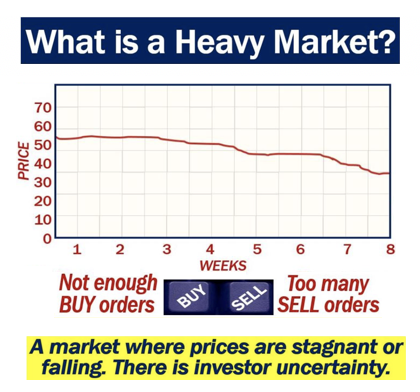A heavy market exists when there is investor uncertainty and either stagnant or falling prices. There is a shortage of buyers, i.e., demand is low, which leads to declining prices. In a heavy market, there are more sell orders than buy orders. The glut in sell orders pushes down prices.
We use the term in any market where investors buy and sell financial instruments. Bonds, commodities, or stocks, for example, are financial instruments.
According to Investor Words, the term refers to:
“A situation in trading that is characterized by a greater amount of sell orders than buy orders. This creates downward pressure on the price of the traded assets.”
Heavy market – a sign of things to come
If economic conditions worsen, a heavy market could be at risk of toppling over, i.e., collapsing.
Worsening uncertainty might also trigger a steeper and longer-lasting decline in prices.
When there is a shortage of buyers and an excess of sell orders, investors start becoming jittery. They may interpret the lack of buyers and declining prices as a sign of things to come.
In other words, the investing community may see it as a precursor to a steep and long-lasting slowdown.

Investor uncertainty can spread
Today, we live in a global village. In other words, across the world, we are virtually like a single community linked by telecommunications.
Events in one country a century ago only affected that country, and perhaps a couple of neighbors. Even major events would only affect neighbors and maybe that country’s main trading partners.
Today, what happens in one country seems to have ever-increasing effects on several economies across the globe.
Globalization has many advantages. However, one of its disadvantages is the speed at which investor uncertainty can spread.
In 2016, the British electorate voted for BREXIT. BREXIT stands for BRitain EXITing the European Union. As soon as the news hit the airwaves, stock market prices globally fell. Initially, they plummeted in the UK, and then Europe, and soon the rest of the world.
A heavy market in the ‘old days’ meant potentially bad news locally. Today, it can mean bad news across whole regions, and even the globe.
